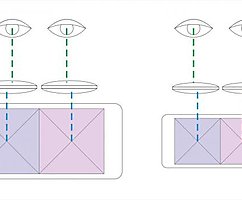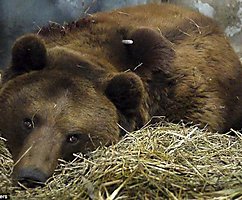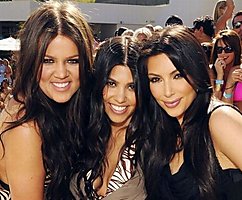Maloideae or conscious caloric restriction diet
 Bashny.Net
Bashny.Net
Counting calories is today's popular way to lose weight and on the basis of this simple methodology built many popular diets. But some go a little further and significantly cut down your daily menu not only for weight to lose, but for a longer time. Units and at all it is possible to reduce the calorie content of your diet considerably below the prescribed minimum level of basic metabolism of 1000-1500 kcal per day.
Under maloideae this implies a considerable reduction in the receipt of calories with food and adaptation of the organism to the corresponding quantities of food. This method daily staple food is different from most diets and offers some different and interesting effects which we will discuss in this article. And will also examine mechanisms of the body at low amounts of power.
We will begin, perhaps, with experiments.
Experiments restriction of calories coming
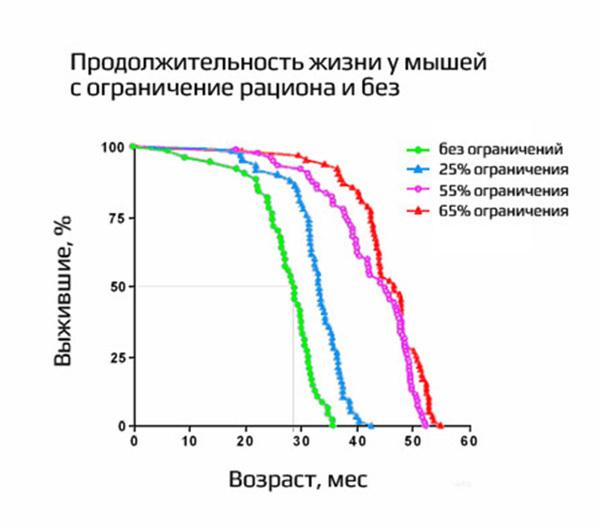
It all started as usual with our smaller brethren. Even back in 1934, the year was first conducted experiments on rats, in which restriction of caloric rations led to the extension of the life of mammals, in some cases, the increase occurred in 2 times in comparison with the control group. Similar studies have been carried out since then in sufficient quantities to many animals.
One of them, for example, was conducted in 1986 Roy Walford, where it was proved a direct relationship between the reduction of the usual diet in mice and increase their lifespan. In addition, the restriction of the diet increased animal activity and resistance to various diseases.
Scientists, of course, was not limited to mice and performed similar experiments on fruit flies, yeast and worms, the effects were similar. These animals experiments were simple, their life cycle is not great, so the observation was easy to carry out, but what happens with more "robust" creatures like man?
Next in line was 20 adult primates, the study of which began in 1989 and continues to this day. 11 of them reduced rations by 30% and began to see the results, but others ate as usual. In 2009, 80% of primates-of maledom was still alive, while half of the individuals from the control group "gluttons" have already died of old age and its attendant ills. Appearance of primates is also telling:
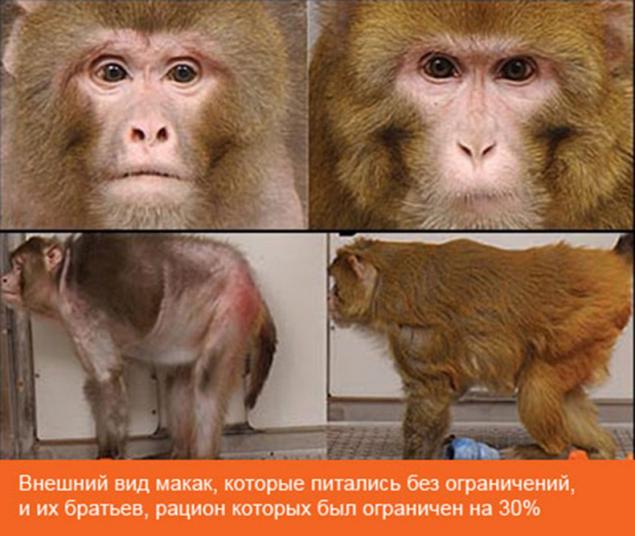
Well, the last time scientists got to people. In the modern world there is a decent amount of followers so-called movement "low calorie food" common in the USA, so the researchers have someone to explore.
The positive side
So, we have already mentioned above some of the positive sides, which causes a decrease in the quantities of food consumed.
The most obvious plus in a restricted diet is of course weight loss with all its attendant circumstances effects: reducing the risk of cardiovascular diseases, atherosclerosis, hypertension, etc. of Course, it is to be expected, "to eat less and move more" on the law remains the surest way to reduce body weight.
Other effects are not so obvious. For example, many proponents of fasting have noted improved working memory and enhanced ability to concentrate, in some cases, during the hunger strike and after it. Similar effects have been noted when maloideae the followers of this diet. Relatively recently, in 2009, it was experimentally shown that restricting foods has a fruitful effect on the human brain. It was shown that the reduction of incoming food by 30% within 3 months provide a significant increase in memory and concentration.
What about probably the most important in all of this — the prolongation of human life? Perhaps this is the main goal of people who are of malaucene. Of course, there is no direct confirming that the person will live longer if you would limit your diet, but it is known that our body reacts to reduce the overall calories in the same way as other organisms on which the research was conducted so the effect is expected.
Mechanisms
How does that work? Why on the one hand scientists say that our absolute minimum 1000-1500 calories a day, but there are people who stepped over that line and are excellent indicators of health?
For a start try to understand why the result of caloric restriction living organisms are able to extend their lives. There are many theories on the causes of aging, depending on which side you look at the process, but all eyes, perhaps, is that our old age is genetically programmed. A living being is doomed to gradually fade after the ripening period, thus there is a lot of "weirdness", among which are: the accumulation of free radicals, gradual extinction of many vital functions, reducing the efficiency of tissue regeneration, etc.
Evolutionary in the body contains a mechanism for adaptation to starvation, which forces us to defer reproductive desires and to concentrate all forces for their own protection and training to maximize the successful operation in the future. For a long period of starvation or severe limitation of food, stimulates the body, forcing him the ability to spend the resources much better, "Doroga" cells in their food. There is a significant adjustment on the hormonal level and included some of the mechanisms that up to this time was inactive.
One of these "switches" was discovered in 2007 by a group of scientists under the leadership of Michael Ristow. In that moment, when the mitochondria of the cells are in a state of lack of glucose begins to increase so-called oxidative stress that is the switch that forces you to rebuild cells and tissues. Otherwise it is impossible, because the stress would just kill us in the end. It sets the pulse that significantly raises the level of immunity and promotes healing.
Such restructuring is simply obliged to transfer the body in a fundamentally different mode of metabolism, which makes you save on energy costs. And savings accounts, first of all, this:
Next, I propose to consider an example of life, is quite revealing in my opinion, which perfectly illustrates how it works on the theory of reducing calorie intake.

Phenomenon G. S. Shatalova
Galina Sergeyevna Shatalova, known in the past, a female neurosurgeon, who lived to 94 years, who wrote a great book and, most interestingly for us, managed to achieve significant results in themselves and their students in terms of reducing the volume of the diet.
Galina claimed that a person is less than 1000 kcal a day, and she proved his words. Her followers have made significant physical results were moving considerable distances through the desert, ran marathons — and all this with minimal amounts of food! (for example: raisins 75g, honey 20g, 30g nuts, 30g rice) sometimes put an official medicine in the confusion. At that time it was definitely the phenomenon today, much of its achievements becomes understandable.
Shatalov believed that a man can live on energy from the air, "prana", assimilating nitrogen from the environment through nitrogen-fixing microorganisms using cold fusion, but its achievement is understandable and without the involvement of supernatural entities.
However, many did not survive for a long time on less than 1000 kcal, even though Galina described the cases where smaller volumes of food. Why? The answer is that people often perceive recommendations on diet taking them from the whole context — are all identical — Shatalov said, not only about calories but also about a balanced system, honed by years of practice. This included not only food, but also healthy habits, and exercise, and autogenic training, and, most importantly, a special breathing practice. And here lies the key. She taught his followers to breathe superficially, thereby reducing the number of respiratory cycles until 3-5 per minute, which led to a significant reduction of oxygen consumption, consuming food. Galina, of course, know what is homeostasis and how it works.
Thus, it not only forced students to eat less, but trained the body to work confidently on this mode of metabolism. Without this additional adaptation of the chances of success are minimal. With the help of some practices, especially respiratory, can significantly reduce the basal metabolism, that the laws of thermogenesis leads to a reduction in volume of food consumed.
In practice this effect to achieve is not easy. This state of "low speed" and full adaptation to it is not all just given, but is the result of serious work on oneself under the guidance of a specialist, which, of course, and was G. S. Shatalova. She not only conducted careful selection and gave the patients less food, but also trained them the digestive system, respiratory and circulation. It is not surprising that her technique has not caught on in the majority — it certainly worked, but sometimes require huge costs, both psychological and physical.
However, this achievement is no mystery, no "miracle" or "power energy sun. Here is the perseverance and work on yourself.
The negative side of malaucene
And what, exactly, are the downsides? If everything flowed well and health will go up and we will live more, what is the catch? A definite answer to this question is no for the simple reason that there is enough practical material on this subject. The number of followers of malaucene still be growing, but people live longer than mice, so to see the results much more difficult. Moreover, we are much more complex than rodents and worms, and our life expectancy depends on many factors, including not only the amount of food eaten, but also genetics, physical activity, psychology and much more. Therefore, it is extremely difficult to put such an experiment that would clearly give us the desired answer.
Here are some pros and cons that have been identified in animals:
Low body weight, including muscle mass. In the short term, there are serious losses of muscle mass and bone density, however, after a certain length of malaucene condition comes back to normal. On the caloric restriction will be extremely difficult to have a built and muscular body, so if you love weight training and excellent results in the gym and in the mirror, this food technique is definitely not for you. Muscle fibers are highly energy-consuming tissue, so it is Malouda, in fact, is not observed.
Problems of a psychological nature. We are all different and for many of us to eat a little very difficult. Among many is the very strong rejection of malaucene, sometimes comes to the fact that a person is constantly in a state of permanent hunger, and in this regard, nervousness and depression. Sometimes suerheroine lead to serious eating disorders, so we have to be very careful.
Problems with childbirth and the natural growth of the child. Long maloideae not recommended during pregnancy and active growth of the child. And the other situation is not the time to practice serious limitations, animals were sometimes observed a strong reduction of functions related to reproduction.
An increased level of mobility and overall activity. Especially in those moments, which were connected with eating. Sometimes even experienced periods of aggression during the meal.
Eating stretched. Animals-Malouda longer eat food on time despite her less. Apparently it is also the result of adaptation to malnutrition.
In conclusion
Very often maloideae associated with spiritual practices or some mystical act, which is available only to the enlightened elect. This practice is not valid for all is simple, for primarily psychological reasons, but it is under a quite understandable theoretical Foundation.
The less we eat, the more you live, now this is a tangible confirmation. For many of us in the modern world, the decline in caloric intake will serve as a good service, it is not surprising that the number of its followers worldwide is only growing. published
P. S. And remember, only by changing their consumption — together we change the world! ©
Join us in Facebook , Vkontakte, Odnoklassniki
Source: truehealth.ru/maloedenie-i-soznatelnoe-ogranichenie-kalorijnosti-raciona/
Under maloideae this implies a considerable reduction in the receipt of calories with food and adaptation of the organism to the corresponding quantities of food. This method daily staple food is different from most diets and offers some different and interesting effects which we will discuss in this article. And will also examine mechanisms of the body at low amounts of power.
We will begin, perhaps, with experiments.
Experiments restriction of calories coming

It all started as usual with our smaller brethren. Even back in 1934, the year was first conducted experiments on rats, in which restriction of caloric rations led to the extension of the life of mammals, in some cases, the increase occurred in 2 times in comparison with the control group. Similar studies have been carried out since then in sufficient quantities to many animals.
One of them, for example, was conducted in 1986 Roy Walford, where it was proved a direct relationship between the reduction of the usual diet in mice and increase their lifespan. In addition, the restriction of the diet increased animal activity and resistance to various diseases.
Scientists, of course, was not limited to mice and performed similar experiments on fruit flies, yeast and worms, the effects were similar. These animals experiments were simple, their life cycle is not great, so the observation was easy to carry out, but what happens with more "robust" creatures like man?
Next in line was 20 adult primates, the study of which began in 1989 and continues to this day. 11 of them reduced rations by 30% and began to see the results, but others ate as usual. In 2009, 80% of primates-of maledom was still alive, while half of the individuals from the control group "gluttons" have already died of old age and its attendant ills. Appearance of primates is also telling:

Well, the last time scientists got to people. In the modern world there is a decent amount of followers so-called movement "low calorie food" common in the USA, so the researchers have someone to explore.
The positive side
So, we have already mentioned above some of the positive sides, which causes a decrease in the quantities of food consumed.
The most obvious plus in a restricted diet is of course weight loss with all its attendant circumstances effects: reducing the risk of cardiovascular diseases, atherosclerosis, hypertension, etc. of Course, it is to be expected, "to eat less and move more" on the law remains the surest way to reduce body weight.
Other effects are not so obvious. For example, many proponents of fasting have noted improved working memory and enhanced ability to concentrate, in some cases, during the hunger strike and after it. Similar effects have been noted when maloideae the followers of this diet. Relatively recently, in 2009, it was experimentally shown that restricting foods has a fruitful effect on the human brain. It was shown that the reduction of incoming food by 30% within 3 months provide a significant increase in memory and concentration.
What about probably the most important in all of this — the prolongation of human life? Perhaps this is the main goal of people who are of malaucene. Of course, there is no direct confirming that the person will live longer if you would limit your diet, but it is known that our body reacts to reduce the overall calories in the same way as other organisms on which the research was conducted so the effect is expected.
Mechanisms
How does that work? Why on the one hand scientists say that our absolute minimum 1000-1500 calories a day, but there are people who stepped over that line and are excellent indicators of health?
For a start try to understand why the result of caloric restriction living organisms are able to extend their lives. There are many theories on the causes of aging, depending on which side you look at the process, but all eyes, perhaps, is that our old age is genetically programmed. A living being is doomed to gradually fade after the ripening period, thus there is a lot of "weirdness", among which are: the accumulation of free radicals, gradual extinction of many vital functions, reducing the efficiency of tissue regeneration, etc.
Evolutionary in the body contains a mechanism for adaptation to starvation, which forces us to defer reproductive desires and to concentrate all forces for their own protection and training to maximize the successful operation in the future. For a long period of starvation or severe limitation of food, stimulates the body, forcing him the ability to spend the resources much better, "Doroga" cells in their food. There is a significant adjustment on the hormonal level and included some of the mechanisms that up to this time was inactive.
One of these "switches" was discovered in 2007 by a group of scientists under the leadership of Michael Ristow. In that moment, when the mitochondria of the cells are in a state of lack of glucose begins to increase so-called oxidative stress that is the switch that forces you to rebuild cells and tissues. Otherwise it is impossible, because the stress would just kill us in the end. It sets the pulse that significantly raises the level of immunity and promotes healing.
Such restructuring is simply obliged to transfer the body in a fundamentally different mode of metabolism, which makes you save on energy costs. And savings accounts, first of all, this:
- The reduction of the total body volume and, above all, reduction of muscle mass;
- Lowering the temperature of the body and the changing nature of the breath.
Next, I propose to consider an example of life, is quite revealing in my opinion, which perfectly illustrates how it works on the theory of reducing calorie intake.

Phenomenon G. S. Shatalova
Galina Sergeyevna Shatalova, known in the past, a female neurosurgeon, who lived to 94 years, who wrote a great book and, most interestingly for us, managed to achieve significant results in themselves and their students in terms of reducing the volume of the diet.
Galina claimed that a person is less than 1000 kcal a day, and she proved his words. Her followers have made significant physical results were moving considerable distances through the desert, ran marathons — and all this with minimal amounts of food! (for example: raisins 75g, honey 20g, 30g nuts, 30g rice) sometimes put an official medicine in the confusion. At that time it was definitely the phenomenon today, much of its achievements becomes understandable.
Shatalov believed that a man can live on energy from the air, "prana", assimilating nitrogen from the environment through nitrogen-fixing microorganisms using cold fusion, but its achievement is understandable and without the involvement of supernatural entities.
However, many did not survive for a long time on less than 1000 kcal, even though Galina described the cases where smaller volumes of food. Why? The answer is that people often perceive recommendations on diet taking them from the whole context — are all identical — Shatalov said, not only about calories but also about a balanced system, honed by years of practice. This included not only food, but also healthy habits, and exercise, and autogenic training, and, most importantly, a special breathing practice. And here lies the key. She taught his followers to breathe superficially, thereby reducing the number of respiratory cycles until 3-5 per minute, which led to a significant reduction of oxygen consumption, consuming food. Galina, of course, know what is homeostasis and how it works.
Thus, it not only forced students to eat less, but trained the body to work confidently on this mode of metabolism. Without this additional adaptation of the chances of success are minimal. With the help of some practices, especially respiratory, can significantly reduce the basal metabolism, that the laws of thermogenesis leads to a reduction in volume of food consumed.
In practice this effect to achieve is not easy. This state of "low speed" and full adaptation to it is not all just given, but is the result of serious work on oneself under the guidance of a specialist, which, of course, and was G. S. Shatalova. She not only conducted careful selection and gave the patients less food, but also trained them the digestive system, respiratory and circulation. It is not surprising that her technique has not caught on in the majority — it certainly worked, but sometimes require huge costs, both psychological and physical.
However, this achievement is no mystery, no "miracle" or "power energy sun. Here is the perseverance and work on yourself.
The negative side of malaucene
And what, exactly, are the downsides? If everything flowed well and health will go up and we will live more, what is the catch? A definite answer to this question is no for the simple reason that there is enough practical material on this subject. The number of followers of malaucene still be growing, but people live longer than mice, so to see the results much more difficult. Moreover, we are much more complex than rodents and worms, and our life expectancy depends on many factors, including not only the amount of food eaten, but also genetics, physical activity, psychology and much more. Therefore, it is extremely difficult to put such an experiment that would clearly give us the desired answer.
Here are some pros and cons that have been identified in animals:
Low body weight, including muscle mass. In the short term, there are serious losses of muscle mass and bone density, however, after a certain length of malaucene condition comes back to normal. On the caloric restriction will be extremely difficult to have a built and muscular body, so if you love weight training and excellent results in the gym and in the mirror, this food technique is definitely not for you. Muscle fibers are highly energy-consuming tissue, so it is Malouda, in fact, is not observed.
Problems of a psychological nature. We are all different and for many of us to eat a little very difficult. Among many is the very strong rejection of malaucene, sometimes comes to the fact that a person is constantly in a state of permanent hunger, and in this regard, nervousness and depression. Sometimes suerheroine lead to serious eating disorders, so we have to be very careful.
Problems with childbirth and the natural growth of the child. Long maloideae not recommended during pregnancy and active growth of the child. And the other situation is not the time to practice serious limitations, animals were sometimes observed a strong reduction of functions related to reproduction.
An increased level of mobility and overall activity. Especially in those moments, which were connected with eating. Sometimes even experienced periods of aggression during the meal.
Eating stretched. Animals-Malouda longer eat food on time despite her less. Apparently it is also the result of adaptation to malnutrition.
In conclusion
Very often maloideae associated with spiritual practices or some mystical act, which is available only to the enlightened elect. This practice is not valid for all is simple, for primarily psychological reasons, but it is under a quite understandable theoretical Foundation.
The less we eat, the more you live, now this is a tangible confirmation. For many of us in the modern world, the decline in caloric intake will serve as a good service, it is not surprising that the number of its followers worldwide is only growing. published
P. S. And remember, only by changing their consumption — together we change the world! ©
Join us in Facebook , Vkontakte, Odnoklassniki
Source: truehealth.ru/maloedenie-i-soznatelnoe-ogranichenie-kalorijnosti-raciona/
Tags
See also
Properties and benefits of bran
Fructose, which you don't eat: what you need to know in order not to harm health
Japanese banana diet - the easiest way to lose weight. Up to 5 kg in a week - it's real!
How to reduce uric acid in the body
Diet menus for a week
How to cheat calories?
Counting calories does not work
In captivity food: 5 ways to get out of gluttony







